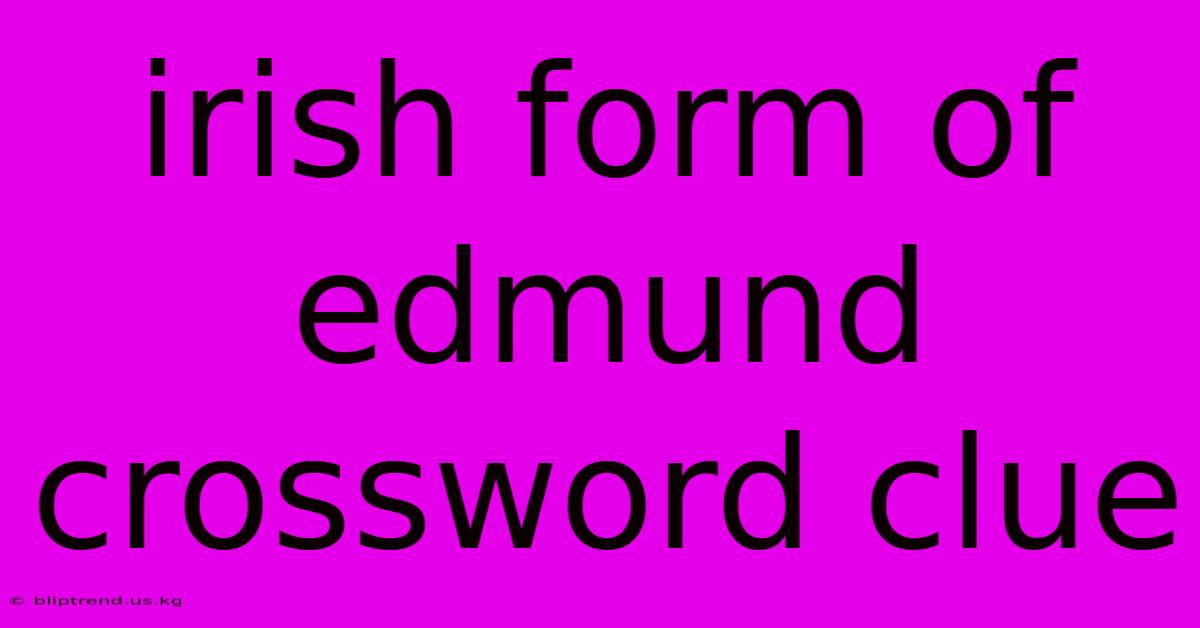Irish Form Of Edmund Crossword Clue

Discover more in-depth information on our site. Click the link below to dive deeper: Visit the Best Website meltwatermedia.ca. Make sure you don’t miss it!
Table of Contents
Decoding the Emerald Isle's Edmund: Exploring Irish Forms for Crossword Clues
This article delves into the fascinating world of Irish names and their variations, specifically focusing on the Irish equivalent of the name Edmund for crossword clues. We'll explore the historical context, phonetic similarities, and potential variations that might appear in cryptic crossword puzzles, providing a comprehensive guide for solvers and setters alike.
Introduction: The Allure of Irish Names in Crosswords
Cryptic crosswords often incorporate names, locations, and historical references to add layers of complexity and intellectual stimulation. Irish names, with their rich history and unique phonetic structures, frequently feature in these puzzles. The name Edmund, while common in English-speaking countries, presents a unique challenge when seeking its Irish counterpart for crossword clues. This is because direct translations are often less common than anglicized or creatively adapted forms.
Edmund: A Name with Roots
Before diving into Irish forms, let's establish the background of the name Edmund. It's of Old German origin, derived from "Eadmund," combining "ead" (wealth, fortune) and "mund" (protection). This rich history lends itself to interesting variations across different cultures and languages. The search for an Irish equivalent requires understanding that a direct, literal translation may not exist. Instead, we look for names that share similar meanings, sounds, or historical connections.
Potential Irish Equivalents and Clues:
Finding the perfect Irish equivalent of Edmund for a crossword clue requires careful consideration. The clue setter might employ several strategies:
-
Phonetic Similarity: The setter may choose an Irish name that sounds phonetically similar to Edmund. This approach relies on clever wordplay and allows for ambiguity, adding to the puzzle's challenge. Consider names with similar sounds, focusing on the "Ed" and "mund" components. Names like "Eamon" (pronounced "AY-mon") and "Eoghan" (pronounced "OH-an") may be considered, though neither is a direct translation. The clue might use wordplay on the similarity in sound. For example: Sound-alike for an Irish Edmund? (Eamon/Eoghan).
-
Meaning-Based Clues: The setter could focus on the meaning of Edmund ("wealthy protector"). Irish names with similar meanings could be used, potentially requiring the solver to have knowledge of Irish etymology. Names related to wealth, protection, or leadership might be appropriate. The clue could be something like: Irish name suggesting prosperity and guardianship (This could lead to several possibilities, adding to the challenge).
-
Anglicized Forms: Many Irish names have anglicized versions used more commonly. The setter might use one of these, relying on the solver's knowledge of the connection between the anglicized form and its Irish root. This requires a more subtle approach, relying on the solver's familiarity with common Irish name variants.
-
Hidden Wordplay: A cryptic clue might hide the Irish equivalent within a longer phrase or sentence. This requires the solver to extract the name from the clue, potentially using anagrams or other wordplay techniques.
Exploring Potential Irish Names:
Several Irish names could potentially serve as crossword clues for "Edmund":
- Eamon: A very common Irish name, easily recognizable. The phonetic similarity is the main connection to Edmund.
- Eoghan: Another popular Irish name. The sound is less similar to Edmund but shares some phonetic elements.
- Domhnall: While phonetically distinct, Domhnall (Donnell in anglicized form) might be used with clever wordplay relating to its meaning or historical associations.
- Diarmuid: This name, anglicized as Dermot, could be used in a clue requiring knowledge of the name's alternative spelling and meaning.
Examples of Crossword Clues:
Let's craft some sample crossword clues incorporating these possibilities:
- Clue 1 (Easy): Common Irish equivalent of Edmund (Eamon)
- Clue 2 (Medium): Sound-alike for an Irish saint’s name, a wealthy protector (Eoghan - referencing potential saintly connections and the meaning of Edmund)
- Clue 3 (Hard): Ancient Irish king, anagram of “mond,” suggests wealth (Domhnall - requiring knowledge of Irish history and anagram solving skills).
- Clue 4 (Cryptic): Partial Irish embrace of English Edmund (Eamon - implying a partial overlap or connection between the names)
The Importance of Context:
The difficulty of the clue will heavily depend on the overall crossword's difficulty level and the solver's assumed knowledge base. A harder crossword might expect the solver to know less common Irish names or to employ more intricate wordplay.
Conclusion: Unraveling the Emerald Enigma
Finding the ideal Irish equivalent of Edmund for a crossword clue is a fascinating exercise in linguistic exploration. It requires knowledge of Irish names, their pronunciations, meanings, and historical context, along with an understanding of the various techniques used in cryptic crossword construction. The success of the clue lies not only in its accuracy but also in its ability to challenge and intrigue the solver, inviting them to engage with the rich tapestry of Irish language and culture. By understanding the different approaches a setter might take—from phonetic similarity to meaningful connections—solvers can significantly improve their chances of deciphering these emerald enigmas. The journey of solving such a clue becomes as rewarding as the solution itself, reflecting the intricate beauty and complexity woven into the world of cryptic crosswords.

Thank you for taking the time to explore our website Irish Form Of Edmund Crossword Clue. We hope you find the information useful. Feel free to contact us for any questions, and don’t forget to bookmark us for future visits!
We truly appreciate your visit to explore more about Irish Form Of Edmund Crossword Clue. Let us know if you need further assistance. Be sure to bookmark this site and visit us again soon!
Featured Posts
-
Onde Assistir Nottingham Forest X Liverpool
Jan 15, 2025
-
Tenderhearted Crossword Clue
Jan 15, 2025
-
Bishops Group Once Crossword Clue
Jan 15, 2025
-
Nottingham Forest Vs Liverpool Horario Do Jogo
Jan 15, 2025
-
Egyptian Sacred Bird Crossword Clue
Jan 15, 2025
